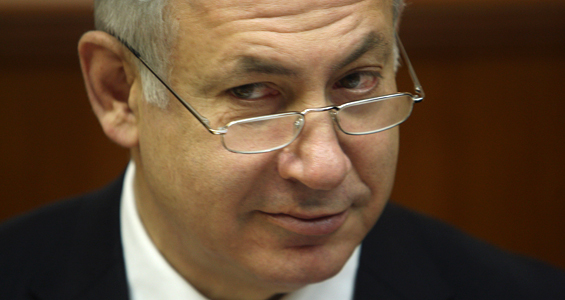World awaits Netanyahu speech
Israelis, Palestinians and the US want answers on settlements and two-state solution.

 |
| Netanyahu’s will deliver his first major foreign policy speech this week [GALLO/GETTY] |
When Binyamin Netanyahu, the Israeli prime minister, takes to the stage at Bar Ilan University near Tel Aviv on Sunday (1700GMT), he will be addressing various different audiences: The Israeli mainstream, Jewish settler groups, his own coalition, the Palestinians, Arab states, the US and the rest of the world.
As he puts the final touches to his speech, Netanyahu may be reflecting on the old adage: You can please some of the people some of the time, but you can’t please all of the people all of the time.
It will be the first major foreign policy speech since Netanyahu took office on March 31, and is being seen as his response to US president Barack Obama’s speech in Cairo earlier this month.
Netanyahu has had a long time to think about this diplomatic initiative: It is ten years since he last held the position of Israeli prime minister.
Israelis and Palestinians will be listening to Netanyahu’s speech for answers to two questions: Will he order a halt to settlement-building in the occupied West Bank and will he commit to a Palestinian state?
Up until now, the prime minister has been deliberately ambiguous on both issues. In his speech, he will give more detail of how he proceeds to move forward, but no-one should expect a categorical “yes” on those two key issues.
American approach
The new US administration is demanding an immediate halt to construction in the settlements.
But Israel keeps on building, both in East Jerusalem and the West Bank, causing a widening rift between the two traditional allies.
Netanyahu has consistently argued that building needs to continue within the existing large settlement blocs to accommodate what is described as “natural growth”.
In the speech, Netanyahu is expected to assert that the settlements are not an obstacle to peace.
Ultimately, Israel hopes to hold on to the larger settlement blocs by agreeing to territorial exchanges with the Palestinians.
The prime minister will not announce a freeze in construction, although he may agree to a temporary halt in exchange for reciprocal gestures from the Palestinians and other Arab states.
As part of a regional process, Netanyahu is hoping that Arab states will take steps towards normalising relations with Israelis, such as granting visas to Israeli business travellers and allowing Israeli civilian aircraft to fly over their territory.
History of settlements
Jewish settler leaders oppose any restrictions on continuing to develop the West Bank and bringing more Israelis to live there.
“It has been a very tough fight since 1967 to move, to develop, to build communities, institutions and have almost 300,000 people now living in the areas of Judea and Samaria,” Yisrael Meidad of the Yesha Council of West Bank Settlements said.
“We will continue to do so whatever [the Israeli] prime minister and whatever [the US] president will be.”
During his latest visit to Israel, George Mitchell, the US envoy to the region, reiterated his country’s commitment to a Palestinian state.
Netanyahu has avoided saying the words “two states” and faces strong resistance to the idea within his own party.
In his speech, Netanyahu is expected to endorse the so-called “road map” which is intended to lead to peace.
Netanyahu’s conditions
But he will present a number of conditions, above all that Palestinians recognise Israel as the homeland of the Jewish people. He will also demand that a future Palestinian state be demilitarised.
“Israel will negotiate with the Palestinians,” Barry Rubin of the Global Research in International Affairs Centre, said.
“If we can reach an agreement and we can get what we want, which is recognition of Israel as a Jewish state, end of conflict and security guarantees, then we can have a two-state solution.
“But a two-state solution is not a present that is given at the beginning of negotiations.”
There’s no concealing the tension right now between Israel and the United States.
President Obama has said he’ll be listening with interest to what Netanyahu has to say.
The speech may go some way to meeting US needs – but Netanyahu has so many conflicting demands that he’s unlikely to satisfy anyone completely.
“The correct formula for Netanyahu, in summing up his speech, is that its success depends on having the left and the right in Israel, and to a degree also the White House, be a bit disappointed in it,” Dan Margalit, a journalist and columnist in Israel Hayom newspaper, wrote.
“If everyone is displeased to a degree, he can consider the speech a success. There is no better test.”